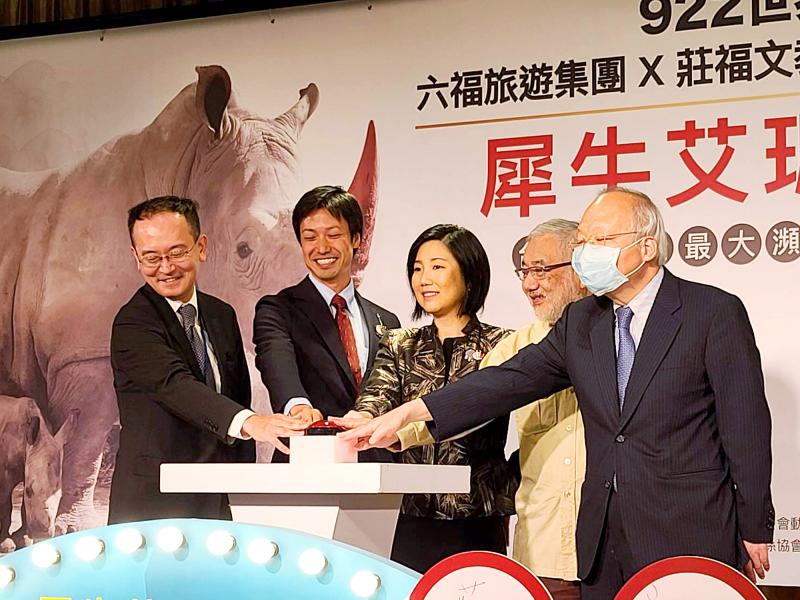The Leofoo Tourism Group (六福旅遊集團) is seeking to shore up its business by reaching out to senior citizens and promoting in-depth tour experiences aided by its eco-friendly theme park in Hsinchu.
Local tourism sectors have to shift their focus away from large group tours to niche markets, as international travel remains restricted due to border controls amid the COVID-19 pandemic, Leofoo chairwoman Lulu Chuang (莊豐如) told a news conference in Taipei.
Given the border restrictions, Leofoo, which owns the Courtyard by Marriott Taipei (六福萬怡) in Nangang District (南港), Leofoo Resort (六福莊), Leofoo Village Theme Park (六福村) and other recreational facilities, is to make better use of its properties in Hsinchu County’s Guansi Township (關西).

Photo: CNA
“We are working to add value to tours through the assortment of animals that the theme park keeps on display for free,” Chuang said.
The group owns 23 rhinos, while the Taipei Zoo only has four, indicating ample room to enhance travelers’ experiences.
For example, the group could better use rhino waste by turning it into incense and using it as fuel for campfires, among other purposes, Chuang said.
Leofoo places great importance on rhino conservation.
To mark this year’s World Rhino Day, the group and Japan’s Tobu Railway yesterday signed an agreement to transport a young female rhino called “Emma” to Japan to build up the country’s rhino population.
The theme park has targeted the nation’s rapidly growing population of older people, who prefer travel experiences that are less physical, but have easy access to nature, Chuang said.
The park’s location in green Guansi presents an ideal destination for package tours that include visits to nearby tourist attractions, she said.

Taiwan Semiconductor Manufacturing Co (TSMC, 台積電) secured a record 70.2 percent share of the global foundry business in the second quarter, up from 67.6 percent the previous quarter, and continued widening its lead over second-placed Samsung Electronics Co, TrendForce Corp (集邦科技) said on Monday. TSMC posted US$30.24 billion in sales in the April-to-June period, up 18.5 percent from the previous quarter, driven by major smartphone customers entering their ramp-up cycle and robust demand for artificial intelligence chips, laptops and PCs, which boosted wafer shipments and average selling prices, TrendForce said in a report. Samsung’s sales also grew in the second quarter, up

On Tuesday, US President Donald Trump weighed in on a pressing national issue: The rebranding of a restaurant chain. Last week, Cracker Barrel, a Tennessee company whose nationwide locations lean heavily on a cozy, old-timey aesthetic — “rocking chairs on the porch, a warm fire in the hearth, peg games on the table” — announced it was updating its logo. Uncle Herschel, the man who once appeared next to the letters with a barrel, was gone. It sparked ire on the right, with Donald Trump Jr leading a charge against the rebranding: “WTF is wrong with Cracker Barrel?!” Later, Trump Sr weighed

LIMITED IMPACT: Investor confidence was likely sustained by its relatively small exposure to the Chinese market, as only less advanced chips are made in Nanjing Taiwan Semiconductor Manufacturing Co (TSMC, 台積電) saw its stock price close steady yesterday in a sign that the loss of the validated end user (VEU) status for its Nanjing, China, fab should have a mild impact on the world’s biggest contract chipmaker financially and technologically. Media reports about the waiver loss sent TSMC down 1.29 percent during the early trading session yesterday, but the stock soon regained strength and ended at NT$1,160, unchanged from Tuesday. Investors’ confidence in TSMC was likely built on its relatively small exposure to the Chinese market, as Chinese customers contributed about 9 percent to TSMC’s revenue last

LOOPHOLES: The move is to end a break that was aiding foreign producers without any similar benefit for US manufacturers, the US Department of Commerce said US President Donald Trump’s administration would make it harder for Samsung Electronics Co and SK Hynix Inc to ship critical equipment to their chipmaking operations in China, dealing a potential blow to the companies’ production in the world’s largest semiconductor market. The US Department of Commerce in a notice published on Friday said that it was revoking waivers for Samsung and SK Hynix to use US technologies in their Chinese operations. The companies had been operating in China under regulations that allow them to import chipmaking equipment without applying for a new license each time. The move would revise what is known